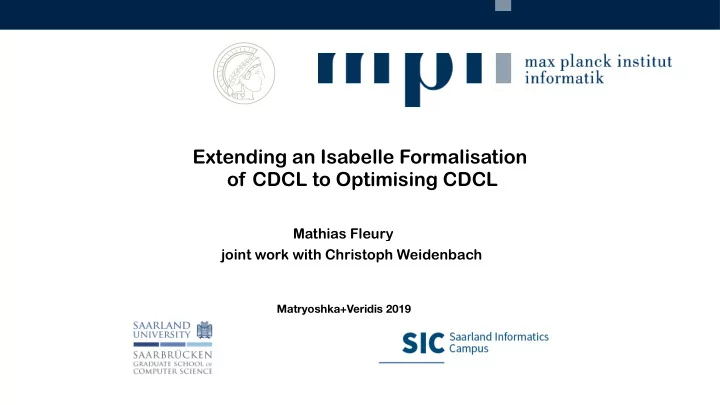

Extending an Isabelle Formalisation of CDCL to Optimising CDCL Mathias Fleury joint work with Christoph Weidenbach Matryoshka+Veridis 2019
Let’s find a model with minimal weight 10 4 ¬ ∨ 20 13 ¬ Optimal partial model: Optimal total model: ¬ � 2
How reliable is the theory? Branch and Bound for Boolean Optimization and the Generation of Optimality Certificates Conference version Javier Larrosa, Robert Nieuwenhuis, Albert Oliveras, and Enric Rodríguez-Carbonell (SAT 2009) A Framework for Certified Boolean Branch-and-Bound Optimization Journal version Javier Larrosa, Robert Nieuwenhuis, Albert Oliveras, and Enric Rodríguez-Carbonell (JAR 2011) � 3
How reliable is the theory? � 4
Let’s optimise our problem 10 = ∨ 20 ⟹ 1 ¬ = 10 ¬ � 5
Let’s optimise our problem OCDCL = CDCL + identify better models + conflicts based on weights � 6
Let’s optimise our problem 10 = ∨ 20 ⟹ 1 ¬ ¬ ¬ 10 ¬ ∨ ∨ ∨ ¬ Optimal model 11 ¬ ¬ ¬ � 7
How lazy do you like your formalisation? Christoph’s view: OCDCL W = CDCL + improve + conflict rules copy-paste of proofs My first idea: OCDCL = CDCL + improve + {-M. cost M ≥ min_cost} reuse CDCL proofs � 8
How lazy do you like your formalisation? My first idea: OCDCL = CDCL + improve + {-M. cost M ≥ min_cost} reuse CDCL proofs My second idea: CDCL bnb = CDCL + improve + T (min_cost) reuse CDCL proofs � 9
How lazy do you like your formalisation? CDCL bnb = CDCL + improve + T (min_cost) OCDCL = CDCL bnb where T (min_cost) = {-M. cost M ≥ min_cost} OCDCL W = OCDCL + restrictions � 10
Reuse! by removing the additional component, can be seen as a fragment of is a special case of CDCL bnb CDCL CDCL definitions and invariants properties � 11
Reuse! Propagate rule in Isabelle C ∨ L ∈ N ⟹ M ⊨ as ¬C ⟹ undefined_lit M L ⟹ (M, N) ⇒ CDCL (L # M, N) obtained for free, thanks to abstraction over the state! also invariants and theorems can be reused Propagate rule in Isabelle C ∨ L ∈ N ⟹ M ⊨ as ¬C ⟹ undefined_lit M L ⟹ (M, N, O) ⇒ CDCLbnb (L # M, N, O) � 12
Reuse! by removing the additional component, can be seen as a fragment of is a special case of CDCL bnb CDCL CDCL definitions and invariants properties � 13
Translate to reuse Propagate rule in Isabelle C ∨ L ∈ N ⟹ M ⊨ as ¬C ⟹ undefined_lit M L ⟹ (M, N, O) ⇒ CDCLbnb (L # M, N, O) Propagate rule in Isabelle C ∨ L ∈ N+ T (min_cost) ⟹ M ⊨ as ¬C ⟹ undefined_lit M L ⟹ (M, N + T (min_cost), O) ⇒ CDCL (L # M, N + T (min_cost), O) � 14
Reuse! by removing the additional component, can be seen as a fragment of is a special case of CDCL bnb CDCL CDCL definitions and invariants properties � 15
Reuse in practise! ignore the additional component CDCL bnb = CDCL + improve + T (min_cost) Inherited: Definitions (for free) � 16
Reuse in practise! no strategy well-founded but terminating for most applications CDCL bnb = CDCL + improve + T (min_cost) Inherited: Termination (for free) Definitions (for free) � 17
Reuse in practise! improve can strategy invariants ⟹ strategy always be applied holds on total models CDCL bnb does not know anything about what is optimised! CDCL bnb = CDCL + improve + T (min_cost) Inherited: Termination (for free) Definitions (for free) Ends with an unsat set (nearly for free) � 18
Why does it work? OCDCL = CDCL bnb where T (min_cost) = {-M. cost M ≥ min_cost} Lemma If I is a total model of N with cost < min_cost, then I is a model of N+ T (min_cost) � 19
Why does it work? Lemma If I is a total model of N with cost < min_cost, then I is a model of N+ T (min_cost) Fails for partial models! � 20
How lazy do you like your formalisation? make sure that the rules on paper and in Isabelle are the same OCDCL W = OCDCL + restrictions � 21
Another application: Dead features = ∨ ⟹ ⟹ ¬ Can every option be true? � 22
How lazy do you like your formalisation? Christoph’s view: CDCLcm W = CDCL + improve + conflict rules copy-paste of proofs My idea: CDCLcm = CDCL bnb where T (models_founds) = {-M. there is a model with more trues in models_founds} � 23
How lazy do you like your formalisation? Lines of codes (kloc) CDCL bnb 2,0 (a lot of boilerplate) OCDCL 1,8 OCDCL W 1,0 can solve Partial Encoding 1,2 MaxSAT 0,4 � 24
Conclusion Concrete outcome ‣ CDCL with branch and bound OCDCL = CDCL bnb where ‣ Via an encoding, also partial optimal models T (min_cost) = {-M. cost M ≥ min_cost} Methodology OCDCL = CDCL bnb where ‣ Locales, locales, locales T (min_cost) = {-D. {M. cost M ≥ min_cost} ⊧ D} ‣ Be lazy! Future work ‣ CDCL( T ) � 25
Conclusion: How about CDCL( T )? But isn’t CDCL( T ) exactly: CDCL bnb where T = {clauses entailed theory} Not exactly, because the wrong conflict clause (negation of the trail) is used � 26
Translate to reuse Theory propagation Propagate rule in Isabelle C ∨ L ∈ N + T (min_cost) ⟹ M ⊨ as ¬C ⟹ undefined_lit M L ⟹ (M, N + T (min_cost), O) ⇒ CDCLbnb (L # M, N + T (min_cost), O) � 27
Recommend
More recommend